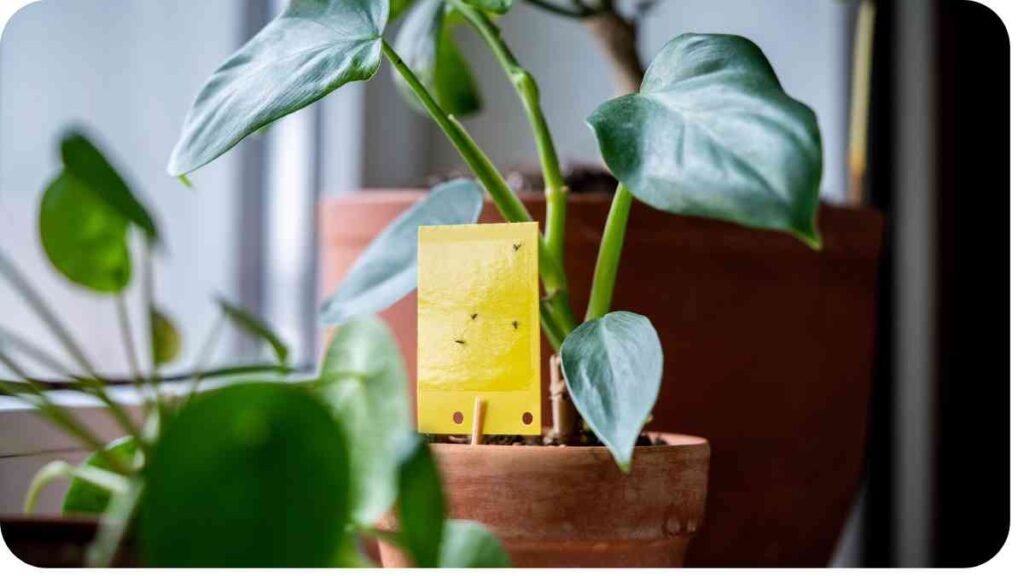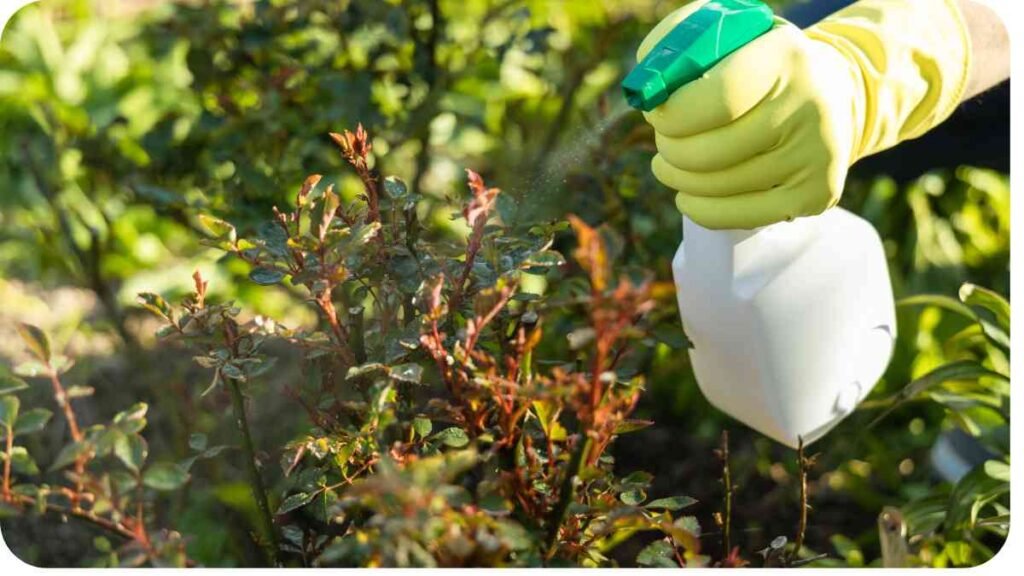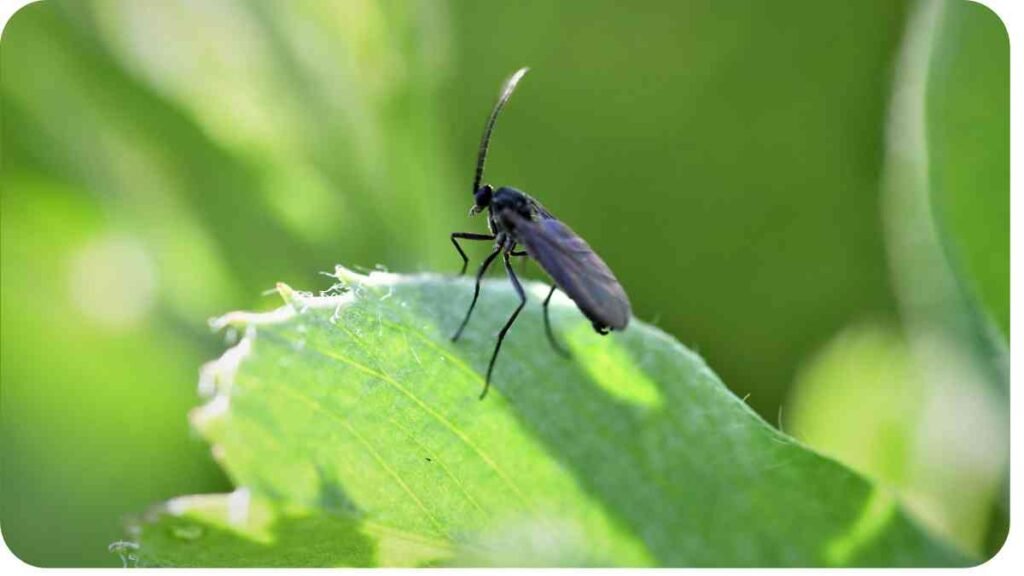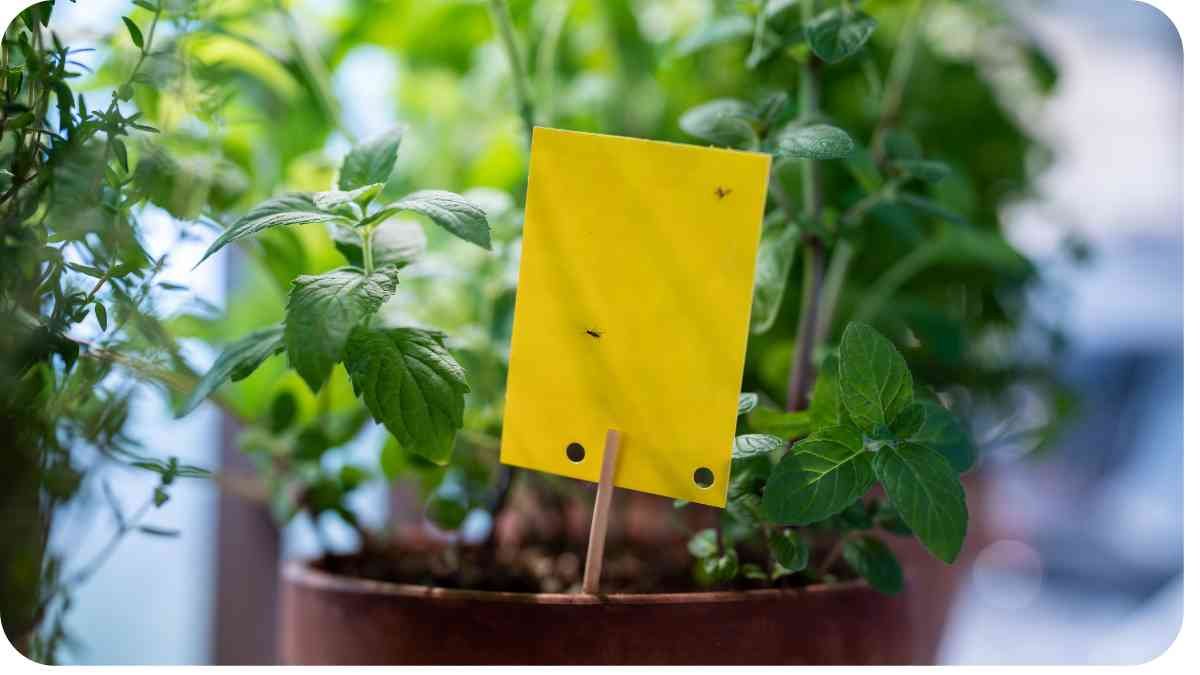Gnats can be a persistent nuisance in herb gardens, disrupting the tranquility of your green oasis and threatening the health of your plants. But fear not! In this comprehensive guide, we’ll explore effective strategies to banish gnats from your herb garden for good.
| Key Takeaways |
|---|
| 1. Gnats can be a nuisance in herb gardens, affecting plant health and overall garden aesthetics. |
| 2. Understanding the types of gnats and their behavior is essential for effective control strategies. |
| 3. Identifying signs of gnat infestation early can prevent further damage to herb plants. |
| 4. Implementing preventive measures such as proper watering and cleanliness can help minimize gnat infestations. |
| 5. Natural remedies like neem oil and beneficial nematodes offer safe and eco-friendly options for gnat control. |
| 6. Chemical solutions should be used judiciously and as a last resort for severe infestations. |
| 7. Maintaining vigilance and good gardening practices can help keep herb gardens gnat-free in the long term. |
2. Understanding Gnats

Before diving into eradication methods, let’s familiarize ourselves with these tiny pests. Gnats belong to the Diptera order and are characterized by their slender bodies and long legs. They are often mistaken for fruit flies due to their similar appearance. Below is a table detailing some common types of gnats you might encounter in your herb garden.
To combat pesky aphids on your roses, try natural remedies like organic strategies. These methods not only protect your plants but also ensure a thriving garden ecosystem.
Table: Common Types of Gnats
| Gnat Species | Characteristics |
|---|---|
| Fungus Gnats | Attracted to moist soil; feed on fungi and decaying organic matter |
| Fruit Flies | Found near ripe or rotting fruits; attracted to sugary substances |
| Drain Flies | Breed in damp environments like drains and sewage systems |
By understanding the different types of gnats, you can better tailor your eradication approach to target the specific species infesting your herb garden.
3. Identifying Gnat Infestations
Gnat infestations can wreak havoc on your herb garden if left unchecked. Here are some telltale signs to watch out for:
Table: Signs of Gnat Infestation
| Signs of Infestation | Description |
|---|---|
| Presence of Adult Gnats | Spotting tiny flying insects near plants or soil |
| Larvae in Soil | Observing small, white maggots in the soil |
| Yellowing Leaves | Herb leaves may turn yellow or wilt due to gnat larvae feeding on roots |
If you notice any of these signs, it’s crucial to take action promptly to prevent further damage to your plants.
4. Causes of Gnat Infestations in Herb Gardens
Understanding the root causes of gnat infestations can help you implement effective preventive measures. Gnat infestations in herb gardens are often triggered by environmental factors and cultivation practices. Here are some common causes:
- Overwatering: Excess moisture in the soil creates a conducive environment for fungus gnats to thrive. Herb gardeners who tend to overwater their plants may inadvertently attract these pests.
- Poor Drainage: Inadequate drainage in pots or planting beds can lead to water accumulation, providing an ideal breeding ground for gnats. Ensure proper drainage by using well-draining soil and adding drainage holes to containers.
- Organic Matter: Decomposing organic matter, such as fallen leaves or dead plant material, can attract gnats. Keep your herb garden tidy by removing debris and regularly pruning dead foliage.
- Warm Temperatures: Gnats are more active in warm, humid conditions. Herb gardens located in hot and humid climates are particularly susceptible to gnat infestations.
Identifying and addressing these underlying causes is essential for effective gnat control in your herb garden.
Discover the secrets to vibrant, low-maintenance houseplants with hydroponic techniques. Implementing these strategies can create an environment less favorable to gnat infestation, promoting healthy growth in your herb garden.
5. Prevention Techniques
Prevention is key when it comes to managing gnat infestations in herb gardens. By implementing proactive measures, you can minimize the risk of a gnat invasion. Here are some effective prevention techniques:
Table: Preventive Measures for Gnat Infestations
| Prevention Technique | Description |
|---|---|
| Proper Watering | Water plants only when the top inch of soil is dry to prevent overwatering |
| Improve Drainage | Use well-draining soil and ensure containers have drainage holes |
| Cleanliness | Keep the herb garden clean and free of debris and decaying matter |
| Air Circulation | Increase airflow around plants by spacing them adequately |
Incorporating these preventive strategies into your gardening routine can help create an inhospitable environment for gnats, reducing the likelihood of an infestation.
6. Natural Remedies for Gnat Control

For gardeners who prefer natural alternatives, several remedies can effectively control gnat populations in herb gardens. These natural solutions are safe for both plants and the environment. Here are some popular options:
Maintain thriving succulents and apply similar principles to manage gnats in your herb garden. Learn valuable care tips for Echeveria and other succulents to elevate your plant game with mastering succulent care.
Table: Effective Natural Remedies for Gnat Control
| Natural Remedy | Description |
|---|---|
| Neem Oil | A botanical insecticide that disrupts gnat life cycles and repels adult gnats |
| Sticky Traps | Yellow sticky traps attract and capture adult gnats |
| Beneficial Nematodes | Microscopic organisms that prey on gnat larvae in the soil |
| Diatomaceous Earth | A powder that dehydrates and kills gnats upon contact |
Using these natural remedies in combination with preventive measures can help keep gnat populations under control without resorting to harsh chemicals.
7. Chemical Solutions for Gnat Control
In severe infestations, chemical solutions may be necessary to eradicate gnats effectively. However, it’s essential to use these products judiciously and follow safety precautions. Here are some chemical options for gnat control:
Prepare your garden for the upcoming season while tackling gnat infestation. Essential fall cleanup tasks not only tidy your garden but also eliminate potential breeding grounds for pests. Transition your garden smoothly with tips from this guide to essential fall cleanup and preparation.
Table: Chemical Solutions for Gnat Control
| Chemical Solution | Description |
|---|---|
| Insecticidal Soap | Kills gnats on contact; safe for use on edible herbs |
| Pyrethrin-Based Insecticides | Derived from chrysanthemum flowers; effective against adult gnats |
| Bacillus thuringiensis (Bt) | Biological insecticide that targets gnat larvae in the soil |
| Systemic Insecticides | Absorbed by plants to kill gnats feeding on roots |
When using chemical solutions, always read and follow the instructions on the label carefully to ensure proper application and safety.
8. Maintaining a Gnat-Free Herb Garden

After implementing gnat control measures, it’s crucial to maintain vigilance to prevent future infestations. Regularly monitor your herb garden for signs of gnats and promptly address any emerging issues. Additionally, continue practicing good gardening habits, such as proper watering and cleanliness, to create an environment that discourages gnat activity.
Optimize your herb garden with container gardening techniques, addressing potential pest issues in the process. Elevate your outdoor space with beautiful container gardens using tips from this guide to gorgeous container gardening.
By staying proactive and attentive, you can enjoy a thriving herb garden free from the pesky presence of gnats.
9. Conclusion
Banishing gnats from your herb garden may require a multi-faceted approach, combining preventive measures, natural remedies, and, when necessary, chemical solutions. By understanding the causes of gnat infestations and implementing effective control strategies, you can ensure the health and vitality of your herb plants.
With persistence and dedication, you’ll soon reclaim your garden from these unwanted pests and enjoy the bountiful harvest of your aromatic herbs.
Further Reading
- Weapons of Gnat Destruction: The Ultimate Guide to Killing Fungus Gnats: This comprehensive guide offers valuable insights into various methods for eradicating fungus gnats from your garden.
- How to Get Rid of Gnats on Indoor Herbs: Learn effective strategies for eliminating gnats specifically in indoor herb gardens with this informative article.
- How to Avoid Fungus Gnats on My Herb Garden Plants: Discover preventive measures and tips for keeping fungus gnats at bay in your herb garden to maintain plant health and vitality.
FAQs
How do I know if my herb garden is infested with gnats?
Gnats can often be spotted flying around plants or soil, and you may also notice small maggots in the soil or yellowing leaves due to gnat larvae feeding on roots.
What are some common causes of gnat infestations in herb gardens?
Gnat infestations in herb gardens are often caused by overwatering, poor drainage, presence of organic matter, and warm temperatures, among other factors.
Are there any natural remedies for controlling gnats in herb gardens?
Yes, natural remedies such as neem oil, sticky traps, beneficial nematodes, and diatomaceous earth can effectively control gnat populations without harming plants or the environment.
How can I prevent gnat infestations in my herb garden?
To prevent gnat infestations, ensure proper watering practices, improve drainage, maintain cleanliness in the garden, and increase air circulation around plants.
When should I consider using chemical solutions for gnat control?
Chemical solutions should be used as a last resort for severe infestations. It’s important to follow safety precautions and consider the impact on the environment before using chemical insecticides.

Hellen James, a seasoned author at Unified Publishers LLC, brings a wealth of expertise to diverse niches. Specializing in pet care, outdoor adventures, lifestyle, wellness, and culinary delights, Hellen crafts insightful and engaging content that unlocks the full potential of readers’ interests. Explore, learn, and thrive with Hellen James.

